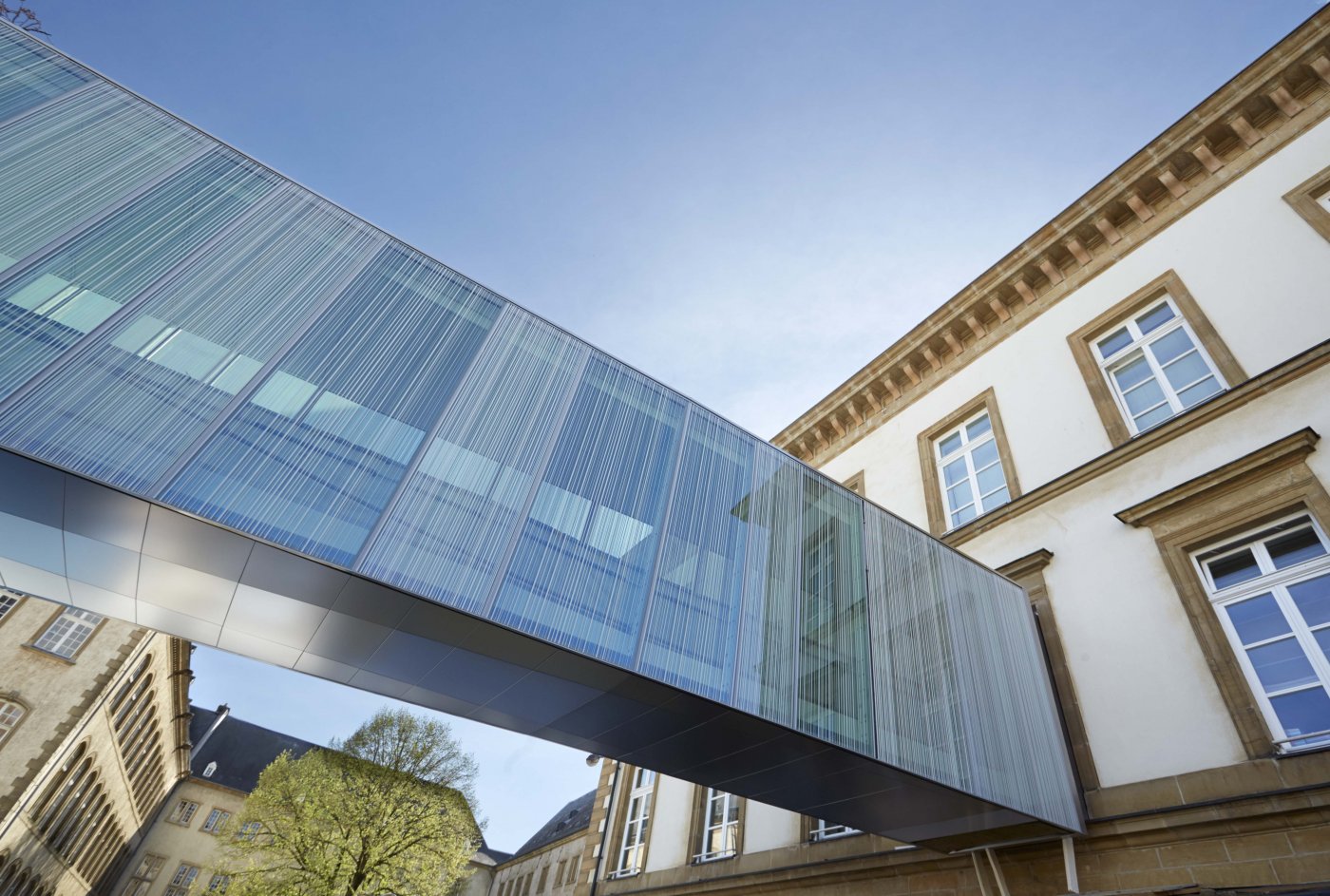Summary record
Video
Early vaccination of the chair of the board of directors of the <i>Hospices Civils de la Ville</i> against Covid-19
QUESTION POSED BY GUY FOETZ
This question is not directed against Henri Grethen personally, but rather against the fact that, as chair of the board of directors of the Hospices Civils de la Ville (the city's modern-day hospices), he was able to get vaccinated against Covid-19 early on. I'd like to point out that the Ministry of Health (Ministère de la Santé) had stated clearly that members of boards of directors should not be vaccinated during phase 1 of the vaccination campaign and that the Hospices Civils de la Ville have the status of public institutions placed under the City's supervision.
Whose idea was it to vaccinate the chair of the Hospices Civils de la Ville early on? What was the reason for this? Was the College of Aldermen aware of this instance of early vaccination? Was it involved in this decision? What is the College of Aldermen's position on this instance of early vaccination? How does it plan to respond? Were other members of the board of directors of the Hospices Civils vaccinated early? Did all staff members who regularly come into contact with residents of the Hospices Civils have the opportunity to be vaccinated in phase 1? Did the Hospices Civils cleaning staff – who also regularly interact with the residents of the Hospices Civils and whose tasks were outsourced to Dussmann Services s.à.r.l. to cut costs – also have the opportunity to be vaccinated?
RESPONSE PROVIDED BY ALDERMAN MAURICE BAUER
The idea to vaccinate the chair of the board of directors early on came from the director of the Hospices Civils, who was making a good-faith effort to implement a cordon sanitaire around the residents. The only reason for the director's decision was to protect the residents and staff. The College of Aldermen is not involved in the vaccination drive in the Hospices Civils. It is not incumbent on the College of Aldermen to take a stance on this instance of vaccination. The College of Aldermen has duly noted Mr Grethen's statements. The lists of vaccinations administered in healthcare institutions that are sent to the health services contain personal data and are therefore subject to data-protection laws. When the vaccination campaign began, healthcare providers, including the Hospices Civils, were notified by the national health services that all of their employees would be receiving an invitation to get vaccinated at a vaccination centre. Starting in early February 2021, staff were able to get vaccinated on-site, meaning that the staff of the Hospices Civils did have this opportunity. On 2 March 2021, the Ministry of Health notified the management of these institutions that people who had not yet been vaccinated could make an appointment after phase 2 of the vaccination campaign. The management sent an internal memo to these staff members informing them that they could get vaccinated and could put their names on a waiting list. Employees of Dussmann, and all other healthcare subcontractors and independent healthcare workers, were excluded from vaccination by the authorities during this phase of the vaccination campaign.
GUY FOETZ
Have the kitchen staff employed directly by the Hospices Civils and the administrative staff also had the opportunity to be vaccinated?
MAYOR LYDIE POLFER
Yes. The Ministry of Health had issued an order to vaccinate only staff under contract with the entity in question. This decision by the ministry is debatable, considering that all hospital workers have been vaccinated regardless of whether they are employed directly by the entity where they work or not. At the same time, the ministry refused to vaccinate a woman who gives daily pedicures to around 20 residents of a home for the elderly, for example.
Rapid Covid-19 testing strategy in Luxembourg City
QUESTION POSED BY FRANÇOIS BENOY
The Government recently announced that terraces will be opening on 7 April 2021, subject to certain conditions. The Chamber of Deputies (Chambre des Députés) is scheduled to vote on this measure next week. I would like to propose that the City introduce rapid Covid-19 testing to heighten public safety and allow residents to make the most of this easing of the restrictive measures, while at the same time helping restaurant and café owners and businesses as a whole. The City could set up stations offering free tests in different locations around the capital, such as in Place de la Gare, Place d'Armes and the Glacis. In an initial phase, they could be open on Saturdays, and when businesses are open on Sundays, or on other days when there are a lot of people around. The initiative could then be extended.
A few weeks ago, the city of Tübingen in Germany set up free rapid-testing stations. The initiative, which is called "Öffnen mit Sicherheit", is being organised in collaboration with the Red Cross, with the University of Tübingen providing scientific oversight. Other German cities, such as Frankfurt, Munich, Kiel and Rostock, are also discussing the possibility of implementing concepts like this.
What is the College of Aldermen's position on this matter? Could the City of Luxembourg set up rapid testing by 7 April, the day the terraces open? If so, on what scale? How could a concept like this be scaled up in the coming weeks to provide Luxembourg City residents and visitors with more freedom and safety? What other pioneering actions does the College of Aldermen think the City could take as the preventive measures are eased?
RESPONSE PROVIDED BY THE MAYOR, LYDIE POLFER
The draft legislation that will be put to a vote by the Chamber of Deputies intentionally does not go in the direction proposed by Councillor Benoy, in keeping with the principle of national solidarity, to which the City of Luxembourg adheres. Since the start of the Covid-19 crisis, the City has served as a model, doing things such as providing hospitals with masks when there was still a mask shortage and sharing its mask supply with other municipalities. The Syndicat des Villes et Communes Luxembourgeoises (Syvicol) also prioritised national solidarity by coming out against the publication of detailed information on the number of infections by municipality so as to avoid pitting municipalities against one another. Councillor Benoy's proposal would run counter to this approach. The Chamber of Deputies has discussed similar measures and intentionally rejected them for the reasons I've mentioned. The City would be willing to support such measures if they were introduced as part of a national strategy, with identical rules for all the municipalities of the Grand Duchy of Luxembourg.
Carrying out tests in public spaces isn't enough – we also need to know how to respond if people test positive. As things stand right now, the relevant national authorities need to continue to direct their efforts at more pressing matters.
FRANÇOIS BENOY
I am well aware of the content of the draft legislation submitted to the Chamber of Deputies for approval. I'm only talking about adding an extra level of public safety. It goes without saying that the legal situation in Germany is different from what we have in Luxembourg.
Renovation of the Martyrs car park ("Rousegäertchen")
QUESTION POSED BY CARLO BACK
A fire broke out inside the Martyrs car park on 9 September 2019. There were no casualties. What was the damage to the car park's infrastructure? Does the College of Aldermen plan to have the car park renovated? If so, what are the arguments to justify such a renovation? Does the College of Aldermen have a quote for renovations and detailed information on the daily occupancy rate of this car park and the other car parks in the Gare district for 2019 and 2020? What conclusions has the College of Aldermen drawn from this analysis?
RESPONSE PROVIDED BY ALDERMAN PATRICK GOLDSCHMIDT
These questions were partially answered as part of the budgetary debates. The support structure was damaged in the fire and needs to be restored. This car park was built in 1984, which means that when it is renovated, it will also need to be brought into compliance with current regulations. The burnt cars weren't removed until 2021, due to the various assessments that needed to be done.
Three options have been discussed: renovating the car park, rebuilding it and getting rid of it. A renovation would cost around €17 million. Demolishing and then rebuilding the car park from scratch would cost more than €31 million. The College of Aldermen decided to retain a car park in this location and renovate the existing one. This decision was taken based on the fact that it has the highest occupancy rate of all the car parks in the Gare district. Before the fire, the occupancy rate was nearly 86% on Monday to Friday between 9:00 and 16:00, compared to 80% for the Rocade car park, 65% for the Nobilis car park and 50% for the Fort Wedell car park. The parking spaces in the car parks must make up for the parking spots that have been lost further to the redevelopment of a number of city squares and streets to make them more inviting.
The final renovation project for the Martyrs car park will be presented to the College of Aldermen around the end of 2021 so work can start around late 2022, with the renovation being completed in the first quarter of 2024.
Civic engagement
QUESTION POSED BY CLAUDINE KONSBRUCK
The coalition agreement states in its introduction that "The College of Aldermen wishes to encourage citizens to get more involved in the planning process for major projects so that, along with the municipal council, we can all better share our views on the resources to be brought to bear to achieve our vision of a welcoming, dynamic and highly liveable city that provides a high quality of life for everyone, in keeping with the principles of sustainable development."
In September 2020, the City's senior officials presented the development plans for Place de l'Étoile. Can the College of Aldermen confirm that it intends to involve citizens in the Place de l'Étoile development project? What is the projected timetable and what are the next steps? Can the College of Aldermen cite the ongoing projects that were adopted following a civic engagement process?
RESPONSE PROVIDED BY THE MAYOR, LYDIE POLFER
The College of Aldermen is prepared to involve citizens wherever possible. Civic engagement events were organised, for example, for the redevelopment of the area around the school in Rue de Strasbourg and the neighbouring playground, and for the new district that will be created along Route d'Arlon. Prior civic engagement events are not organised for special development plans (plan d'aménagement particulier – PAP), the basic elements of which would have already been discussed and established as part of the formulation of the general development plan (plan d'aménagement général – PAG) (housing, offices or businesses, density, etc.). However, once the PAP in question has been drawn up, meetings are held with citizens to present it to the public. The public then has three months to submit their comments and complaints. It is not unheard of for a PAP to be amended in response to comments from residents.
A civic engagement procedure will be organised for the project for the Old Slaughterhouse in Hollerich. Working groups will be created to get citizens closely involved in developing a plan for the Old Slaughterhouse. There is not yet a PAP for Place de l'Étoile – the illustrations displayed in 2020 were not concrete proposals. The Minister of Public Works came to Luxembourg City Hall to present the plans for the redevelopment of Route d'Arlon where it meets Place de l'Étoile and the extension of the tram route to the Kannerklinik. These allow for the redevelopment of Place de l'Étoile with a bus station below ground level. Citizens will have an opportunity to submit questions and comments once the PAP has been drawn up.
Air pollution in Luxembourg City
QUESTION POSED BY CARLO BACK
A series of studies has been conducted on air pollution in some 400 European cities, including Luxembourg City. The studies were conducted by the European Environment Agency, and the European Public Health Alliance, among others. For Luxembourg City, the socio-economic impact of air pollution was estimated to cost approximately €166 million. Included in this amount are the costs incurred as a result of medical treatment, the reduction in life expectancy, the increase in mortality risk, lost working days, hospitalisation for respiratory and cardiac diseases, and the prevalence of bronchitis and asthma in children.
Where air quality in Luxembourg City is concerned, nitrogen oxide (NO2) is the most significant factor. In 2019, the threshold value for nitrogen oxide – i.e. 40 micrograms per cubic metre – was regularly exceeded at half of the 11 air-quality monitoring stations in the city. In 2020, during the Covid-19 pandemic, that threshold was not exceed in the vicinity of the Rocade de Bonnevoie. The City published these findings in the November 2020 edition of "City" magazine, accompanied by an appeal to inhabitants to leave their cars at home and instead choose more sustainable modes of transport.
How does the College of Aldermen plan to adapt its policy on managing road traffic to better protect the health of the city's residents and visitors, especially in light of the scientific evidence mentioned earlier and the established correlation between the reduction in road traffic during the lockdown and the reduction in the concentration of nitrogen oxide? What steps does the College of Aldermen intend to take to prevent nitrogen oxide values from rising again to pre-pandemic levels, and to encourage residents to adopt more sustainable modes of transport?
RESPONSE PROVIDED BY ALDERMAN PATRICK GOLDSCHMIDT
The air quality monitoring stations mentioned by Councillor Back are equipped with passive-tube samplers, which are analysed and replaced every two weeks. The bi-weekly averages from those stations cannot be compared to the 40 μg/m3 threshold he mentioned, as that threshold is based on an annual average concentration of NO2. However, one can calculate annual averages for 2018, 2019 and 2020 based on the passive-tube samples from the monitoring stations and then compare these to the annual average threshold value of 40 μg/m3. In doing so, it turns out that most of the values are in fact below the threshold, and indeed are falling with each passing year, with a marked Covid effect in 2020.
The City will continue directing efforts at improving the modal split between public transport and active travel options. The entire fleet of buses operated by the City of Luxembourg is to be replaced with electric buses. Most RGTR lines will be phasing out routes through the city centre. As a result of these measures, the values will continue to improve year after year. Since part of the workforce will continue working remotely, it is highly unlikely that the 40 μg/m3 threshold will be exceeded again in the future.

















